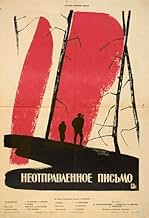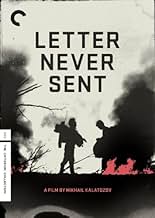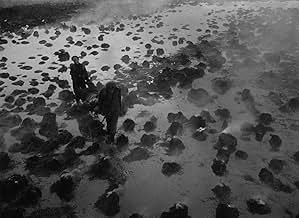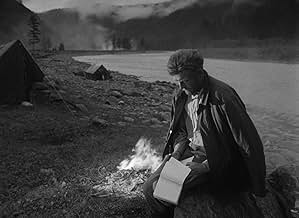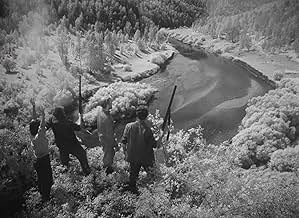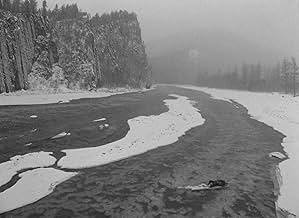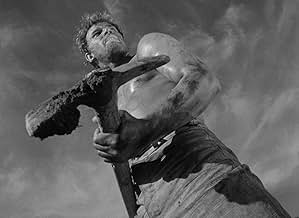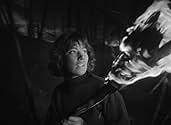NOTE IMDb
7,8/10
4,7 k
MA NOTE
Quatre géologues recherchent des diamants dans les étendues sauvages de Sibérie.Quatre géologues recherchent des diamants dans les étendues sauvages de Sibérie.Quatre géologues recherchent des diamants dans les étendues sauvages de Sibérie.
- Réalisation
- Scénario
- Casting principal
- Récompenses
- 1 nomination au total
Innokentiy Smoktunovskiy
- Konstantin Sabinin
- (as I. Smoktunovskiy)
Tatyana Samoylova
- Tanya
- (as T. Samoylova)
Vasiliy Livanov
- Andrey
- (as V. Livanov)
Evgeniy Urbanskiy
- Sergey Stepanovich
- (as Ye. Urbanskiy)
Galina Kozhakina
- Vera
- (as G. Kozhakina)
Avis à la une
In Mikhail Kalatozov's Letter Never Sent, four geologists are searching for diamonds in the wilderness of Siberia. Three men, one woman. Andrei and Tanya are in love. Sergei is in love with Tanya. Sergei is a strong man who had been on such expeditions but had returned with no luck. He is jealous of the nerdy Andrei's and the beautiful Tanya's relationship but never cares to hide that feeling. Sabinine (The Leader of the expedition) often spends his free time writing letters, which he will never send, to the woman he once loved. This is how the film begins: By presenting a set of characters, each having different perspectives but are present in the wild forests of Siberia for one reason. With the hope of serving their country, they are present there hunting for a diamond vein. It's no surprise that the diamond deposit is discovered in the film after days of hard work. Previous expeditions had failed but this one expedition proved that there indeed was a diamond deposit in Siberia. Soon, the four geologists, filled with zeal and satisfaction, find themselves engulfed by a huge forest fire and completely cut of from the civilized world. Will they survive?
Before the opening credits, the film pays tribute to the people of the Soviet Union who have given their lives for the benefit of the country, whether it be astronauts seeking answers for the mysteries of space or geologists going in to the wilderness hunting for diamonds. Throughout the entire film, we see the characters suffering in the piercing cold and bleak atmosphere of Siberia. Their goal at this point is to safely deliver the map, on which the whereabouts of the diamond deposit is marked, to Moscow. We see sacrifice. We witness loss. We witness alienation, hunger, despair. This is where I realized that similar to numerous Soviet films, Letter Never Sent contains shards of Propaganda. Adventure? Nope. I look at this one as a miserable survival film filled with some unnecessary moments of melodrama, patriotism and hyperactivity. The fact is that I don't mind patriotism and propaganda. But in this case it's overdone. I just didn't care for any of the characters. Not even the gorgeous Tatiana Somailova whose performance in the 1957 Soviet Classic The Cranes are Flying (Also directed by Mikhail Kalatozov) was spellbinding. It was because of this film that I was intrigued to check out Letter Never Sent.
Now the big question: What relation does the film and it's title have? As stated earlier, Sabinine wrote letters to a woman he loved from his past. He wrote them, feeling nostalgic, without the intention of sending them (Of course, the team is already in the middle of nowhere). This relation is explained further in the final moments of the film but it's significance is again directed more towards patriotism, in my opinion. Another disappointing aspect.
Unlike the ingenious masterpiece The Cranes are Flying, this film lacks true emotions. I went in with high hopes of seeing another Soviet masterpiece but eventually I was left disappointed. Albeit this film failed to emotionally engross me, Sergei Urusevsky's miraculous cinematography makes the film worth watching. Urusevsky and Kalatozov have collaborated in multiple films and their most well known work is of course The Cranes are Flying, where the film used astonishing camera- work. Though I believe Letter Never Sent takes it to a whole new level by composing unbelievable images. The camera work is well ahead of it's time. It looked like that the camera glided through the wild fire and the horrible blizzards very smoothly. The technical artistry of this film deserves a standing ovation and at times it completely overpowers the dissatisfying screenplay.
On the positive side, Letter Never Sent is one of the strongest proofs of how visually powerful cinema can be. If you ever tell me to compile a top 10 list of the most visually stunning films ever crafted, this one will gladly make it to the top 5. Mr. Urusevsky, you rock. (And I will highly recommend The Cranes are Flying in case you haven't seen it yet).
filmsmostbeautifulart.blogspot.in
Before the opening credits, the film pays tribute to the people of the Soviet Union who have given their lives for the benefit of the country, whether it be astronauts seeking answers for the mysteries of space or geologists going in to the wilderness hunting for diamonds. Throughout the entire film, we see the characters suffering in the piercing cold and bleak atmosphere of Siberia. Their goal at this point is to safely deliver the map, on which the whereabouts of the diamond deposit is marked, to Moscow. We see sacrifice. We witness loss. We witness alienation, hunger, despair. This is where I realized that similar to numerous Soviet films, Letter Never Sent contains shards of Propaganda. Adventure? Nope. I look at this one as a miserable survival film filled with some unnecessary moments of melodrama, patriotism and hyperactivity. The fact is that I don't mind patriotism and propaganda. But in this case it's overdone. I just didn't care for any of the characters. Not even the gorgeous Tatiana Somailova whose performance in the 1957 Soviet Classic The Cranes are Flying (Also directed by Mikhail Kalatozov) was spellbinding. It was because of this film that I was intrigued to check out Letter Never Sent.
Now the big question: What relation does the film and it's title have? As stated earlier, Sabinine wrote letters to a woman he loved from his past. He wrote them, feeling nostalgic, without the intention of sending them (Of course, the team is already in the middle of nowhere). This relation is explained further in the final moments of the film but it's significance is again directed more towards patriotism, in my opinion. Another disappointing aspect.
Unlike the ingenious masterpiece The Cranes are Flying, this film lacks true emotions. I went in with high hopes of seeing another Soviet masterpiece but eventually I was left disappointed. Albeit this film failed to emotionally engross me, Sergei Urusevsky's miraculous cinematography makes the film worth watching. Urusevsky and Kalatozov have collaborated in multiple films and their most well known work is of course The Cranes are Flying, where the film used astonishing camera- work. Though I believe Letter Never Sent takes it to a whole new level by composing unbelievable images. The camera work is well ahead of it's time. It looked like that the camera glided through the wild fire and the horrible blizzards very smoothly. The technical artistry of this film deserves a standing ovation and at times it completely overpowers the dissatisfying screenplay.
On the positive side, Letter Never Sent is one of the strongest proofs of how visually powerful cinema can be. If you ever tell me to compile a top 10 list of the most visually stunning films ever crafted, this one will gladly make it to the top 5. Mr. Urusevsky, you rock. (And I will highly recommend The Cranes are Flying in case you haven't seen it yet).
filmsmostbeautifulart.blogspot.in
Welcome to Siberia, circa 1959 (in perfectly restored, glorious Black and White).
Although this story revolves around four 'pioneers' dropped into a vast wilderness to search for a rumored vein of diamonds (aka 'the Diamond Pipe'), the real star of the movie is cinematographer Sergei Urusevsky ("Soy Cuba," "The Cranes Are Flying").
Urusevsky is master of composition, dolly shots, and hand-held photography (when necessary). The way he frames his close-ups of the actors practically allows the audience to see into their souls.
Of course, it helps that he's shooting a top-notch Russian cast, including actress Tatyana Samojlova ("The Cranes Are Flying") whose character 'Tanya' is desperate to survive the troubling events that befall the group. Tanya is also the lone female and commands the attentions of two men in the rock-sampling group (though one is unrequited).
In addition, the visual elements are underscored aurally by composer Nikolai Kryukov's ("The Forty-first") evocative score, although he does amp up the music a bit too much in a couple of scenes. Not unusual for the time period, so set your appreciation meter back to the 50's and you won't be as bothered as I was.
The title of the film refers to not one but two letters that figure into the plot. One is a long, personal letter that is referred to in voice-over from time to time throughout the film, while the other is a love letter thought to be hidden away until it accidentally comes to light.
The plot is very straightforward so I won't spoil any surprises by detailing it here, suffice to say that the main attractions of this film are the artistic cinematography, the strong cast, and the director's choice to foreshadow plot elements by overlaying fiery images over his hardcharging trekkers.
If you've never seen any films by director Mikhail Kalatozov ("The Red Tent," "Soy Cuba," "The Cranes Are Flying"), then this one is probably as accessible as any and with a new restoration to boot, practically a MUST-SEE.
The ending alone is worth the price of admission, so check it out festival goers.
Although this story revolves around four 'pioneers' dropped into a vast wilderness to search for a rumored vein of diamonds (aka 'the Diamond Pipe'), the real star of the movie is cinematographer Sergei Urusevsky ("Soy Cuba," "The Cranes Are Flying").
Urusevsky is master of composition, dolly shots, and hand-held photography (when necessary). The way he frames his close-ups of the actors practically allows the audience to see into their souls.
Of course, it helps that he's shooting a top-notch Russian cast, including actress Tatyana Samojlova ("The Cranes Are Flying") whose character 'Tanya' is desperate to survive the troubling events that befall the group. Tanya is also the lone female and commands the attentions of two men in the rock-sampling group (though one is unrequited).
In addition, the visual elements are underscored aurally by composer Nikolai Kryukov's ("The Forty-first") evocative score, although he does amp up the music a bit too much in a couple of scenes. Not unusual for the time period, so set your appreciation meter back to the 50's and you won't be as bothered as I was.
The title of the film refers to not one but two letters that figure into the plot. One is a long, personal letter that is referred to in voice-over from time to time throughout the film, while the other is a love letter thought to be hidden away until it accidentally comes to light.
The plot is very straightforward so I won't spoil any surprises by detailing it here, suffice to say that the main attractions of this film are the artistic cinematography, the strong cast, and the director's choice to foreshadow plot elements by overlaying fiery images over his hardcharging trekkers.
If you've never seen any films by director Mikhail Kalatozov ("The Red Tent," "Soy Cuba," "The Cranes Are Flying"), then this one is probably as accessible as any and with a new restoration to boot, practically a MUST-SEE.
The ending alone is worth the price of admission, so check it out festival goers.
A quite ridiculous film about diamond hunters in Siberia by the extraordinary director/cinematographer team of "I Am Cuba" and "The Cranes Are Flying." Needless say, the camerawork in the bizarrely surreal and barren Siberian locations is UNBELIEVABLE (the continuous takes are longer than any other film in history except for "I Am Cuba") but the film itself is too directly tied to dramatic 'adventure story' conventions to transcend into pure poetry like "Cranes" and "Cuba." There is a spectacular scene shot with the main actors amidst a raging forest fire and another one shot during an ice-storm. Most definitely worth transferring to DVD (there isn't a true film fan that wouldn't be flabergasted by the cinematography) but not by the same ones (Hen's Tooth) who did such a mediocre job on the transfer of "I Am Cuba."
9Fpi
This is a totally excellent man vs. nature drama. An outstandingly dramatic soundtrack is coupled with some of the most powerful and unique visuals I've ever seen. If you thought Tarkovsky was a one-shot in the Soviet Union when it came to beautiful yet haunting images, you'll definitely think again after this movie. The characters and the story are perhaps not too well developed, but this somehow adds to the sense of not being totally in control, which is important here. It's nothing short of a tragedy that this movie is totally unknown; it would probably have been a candidate of reaching IMDb's top 50 if it were. Those looking for unknown classics should hunt this one down at all costs.
Saw this at Tribeca Film Festival in Spring 2007, and was absolutely floored. I walked out of the theater afterword amazed at what I'd seen and thrilled that such an amazing film existed and had been maintained by a tiny number of appreciators in such excellent quality for so long.
The story is not the strong point of the movie. Rather, as with Terence Malick films, the story is just a starting point for the film, which is another beast entirely. What shines and carries the film from scene to scene is the cinematography. I didn't know if this was happened elsewhere at the time, but I didn't expect to see hand-held camera work in a 1959 Russian film, let alone the kind of early spinning, impossibly-filmed shot that appears early in the film. Later, there is a sequence that makes me long to know how they created the opportunity to film in such conditions.
If you've read this far, you must track down this movie. My understanding is that Francis Coppola has a California archive maintain the only copy in the Americas, and that it's usually shown just one a year.
The story is not the strong point of the movie. Rather, as with Terence Malick films, the story is just a starting point for the film, which is another beast entirely. What shines and carries the film from scene to scene is the cinematography. I didn't know if this was happened elsewhere at the time, but I didn't expect to see hand-held camera work in a 1959 Russian film, let alone the kind of early spinning, impossibly-filmed shot that appears early in the film. Later, there is a sequence that makes me long to know how they created the opportunity to film in such conditions.
If you've read this far, you must track down this movie. My understanding is that Francis Coppola has a California archive maintain the only copy in the Americas, and that it's usually shown just one a year.
Le saviez-vous
- AnecdotesIn 1995 the film was restored by and shown in United States upon the financial support from Francis Coppola.
- Citations
Andrey: Sergei, you've fallen in love with a girl who loves someone else, and that man loves her. From the moral standpoint it's wrong.
Sergey Stepanovich: I don't give a damn about your bookish morale. I'm in love.
Andrey: That's an egoist speaking.
- ConnexionsFeatured in Fejezetek a film történetéböl: A szovjet film 1953-1970 (1990)
Meilleurs choix
Connectez-vous pour évaluer et suivre la liste de favoris afin de recevoir des recommandations personnalisées
- How long is Letter Never Sent?Alimenté par Alexa
Détails
- Date de sortie
- Pays d’origine
- Site officiel
- Langue
- Aussi connu sous le nom de
- La lettre non envoyée
- Lieux de tournage
- Mosfilm Studios, Moscou, Russie(Studio)
- Société de production
- Voir plus de crédits d'entreprise sur IMDbPro
- Durée
- 1h 36min(96 min)
- Couleur
- Mixage
- Rapport de forme
- 1.37 : 1
Contribuer à cette page
Suggérer une modification ou ajouter du contenu manquant

